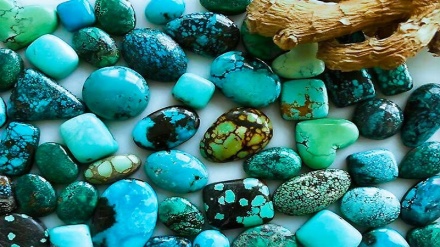Iranian Market (30)
Welcome to another episode of the Iranian Market. In this edition of our weekly program, we’re going to discuss how Iranians since ancient times have produced the best quality rosewater in the world.
Since very old times, the Iranian people used to treat rose flower (which is called as Gol Mohammadi in Iran) with special admiration and respect.
The production of rosewater- which is called Golab in Farsi language- has a long history of thousands of years. The Iranian city of Kashan, especially the small town of Qamsar in the vicinity of Kashan, are the main hubs of producing rose water in Iran. In Isfahan province, a big variety of roses grows. The petals of the plant are collected and used for the production of rosewater. Important ingredients of this flower are tannin and various fatty acids.
Producing rosewater in Iran is accompanied by very interesting ceremonies and festivals.
Traditionally, the ceremony of rose flower picking begins hours before sunrise in order to preserve the unique fragrance of the flower.
The picked flowers are collected and placed in huge copper pots. Water is added and the mixture is poured into an oven made of brick and cement or stones and mud. Then a big fire is made and while water boils, rosewater steam is released with essential oils, which flows through aluminum pipes into a special container. The entire distillation process takes around 4 hours, and finally 40 liters of rosewater are produced out of 30 kg of flowers.
In Iran, rose and rosewater festivals take place every year from mid-May to mid-June in the cities of Kashan and the adjacent towns like Qamsar and Niasar. The picking of roses and producing rosewater starts from early May and continues till mid-June. In early May, the air is filled with the fragrance of roses. The ceremony of making rosewater in Kashan attracts thousands of tourists from across the country and all over the world.
Rose water is obtained from very fragrant species. It is often used as a perfume. To date, modern mechanized centers have been built in Iran, but a significant part of rosewater is still produced in the traditional way. This is what attracts tourists to Kashan.
Rosewater has several advantages for the treatment and prevention of many diseases. In Iran’s traditional medicine, this flower is called the miracle of the nature. According to religious texts, the Messenger of Mercy, Prophet Mohammad (blessings of God upon Him and His progeny) was very fond of using rosewater because of its medicinal effects. That is why this flower is called Gol Mohammadi, meaning "The Flower of Mohammad."
In the Iranian traditional medicine since ancient times people have been aware of the healing properties of rosewater. Rosewater is an excellent anti-stress drug. It can strengthen the nervous system and help fight against insomnia. Rosewater has anti-inflammatory properties. It is effective in the treatment of gastrointestinal tract diseases, as well as bleeding and inflammation of the oral cavity.
Rosewater refreshes the skin and gives it a silky smoothness.
Iranians also cook different kinds of sweets, candies and desserts by this magic syrup. Among these delicious desserts mention can be made of Halva, Shole Zard, Masqati, Rahat-ol-holqoom, etc.
The high quality rosewater of Iran is not only exported to different countries around the world, each year it is used to wash the holy Ka'ba in Mecca which is the most sacred place for Muslims in the world.
AE/RM/ME


